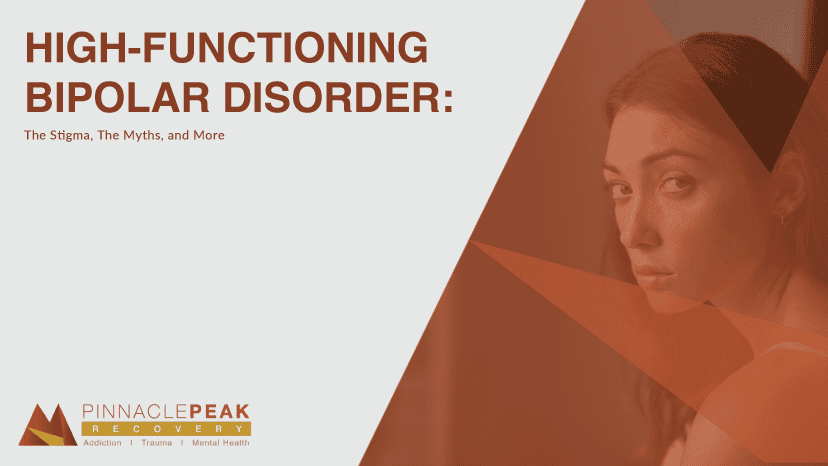“No one would ever tell a cancer patient to ‘just get over it.’ Why people think they can tell those with a mental illness as much is baffling.” - Sara Ella
Are there any labels in your life that define you? For example, if you work in a school you might use the label “teacher” when describing yourself. Maybe a combination of your aesthetic and taste in music could give you a label like “alternative.” If you practice yoga frequently and enjoy a freer lifestyle, someone might call you a “hippie.”
Labels can have pros and cons. Sometimes you might love a label and claim it for yourself. Other times a label might feel wrong, oppressive, or even rude. So what about labels used to describe people with mental health conditions like bipolar disorder?
The term high-functioning is sometimes used to describe someone who has a mental health condition. Our team at Pinnacle Peak Recovery has seen the impact that this label can have on people getting support and care. With over 10 million people across the country living with bipolar disorder, it’s important to know more about this label. Let’s talk about high-functioning bipolar disorder, what it is, and if this term is even accurate in the first place.
What Does “High-Functioning” Even Mean?
The concept of “high-functioning” originates specifically in regard to autism. It was used to describe those who had lower support needs. This term is still most often used in combination with autism, but it is sometimes applied to other mental health conditions, like bipolar disorder.
Overall, the term simply means someone who doesn’t showcase their symptoms as outwardly, or who doesn’t require as much outside support to manage their condition.
Is the Term “High-Functioning” Medically Accurate?
Despite its use in mainstream media, someone cannot be diagnosed with a “high-functioning” version of a condition. The term itself is misleading and can lead to someone not getting the support they need due to misconceptions.
While it was never in the DSM (Diagnostic and Statistical Manual of Mental Disorders), prior to 2013 there were reflections of the “high-functioning” mentality. Conditions like autism were split in two, with one being more “high-functioning” than the other. Now, conditions are more often to be separated into degrees of severity or split into different subsets of the condition depending on the symptoms showcased. This allows clients to get a more accurate diagnosis in combination with better treatment.
What Makes Someone With Bipolar Disorder “High-Functioning”?
There is no true “high-functioning” diagnosis for bipolar disorder. Everything from family history to other mental health conditions and life experiences can impact how bipolar disorder impacts an individual.
Other things that can change how “outward” someone’s bipolar disorder is can include things like their support system and if they’re currently in treatment. Bipolar disorder, like many other mental health conditions, is completely manageable with the right tools at a person’s disposal. To better understand how bipolar disorder can impact an individual, let’s take a closer look at the different types of bipolar disorder.
Understanding the Different Kinds of Bipolar Disorder Diagnosis
There are three different kinds of bipolar disorder diagnosis. They differ depending on what primary symptoms a person experiences, as well as how intense their experience is with the side effects. They’re defined by how often they experience highs and lows, including intense periods known as manic episodes and depressive episodes respectively.
Manic episodes consist of “highs.” During a manic episode, a person will feel very high energy. They will sleep less and act jumpier than normal. Often things like appetite increase, as well as having an increased desire for pleasurable activities like sex or drinking. In some instances, this increased energy can also turn into irritability. Hypomanic episodes can offer any combination of these symptoms, but they’re less severe than a full manic episode.
Depressive episodes are the opposite of manic episodes. During these episodes, a person might feel like the world around them is slowed down or less exciting than normal. They’ll experience difficulties concentrating, difficulties staying awake, and low motivation. People in a depressive episode are at increased risk of self-harm and suicidal ideation.
Bipolar I disorder - Someone who’s diagnosed with Bipolar I primarily experiences manic episodes that last for at least a week, with symptoms occurring nearly every day for the majority of the day. They can also experience depressive episodes that typically last 2 weeks or longer. Mixed episodes, which showcase symptoms of both manic and depressive episodes, are also possible.
Bipolar II disorder - If someone is diagnosed with Bipolar II, they primarily experience depressive episodes and hypomanic episodes, instead of full manic episodes.
Cyclothymic disorder - Sometimes referred to as cyclothymia, those diagnosed with this form of bipolar disorder experience both hypomanic and depressive symptoms. They’re not as intense and do not last as long as full episodes.

The Stigma Around Bipolar Disorder and How It Impacts Everyone
Stigma surrounding mental health conditions, like bipolar disorder, is not new. In many cases, it runs deep within people, so much so that they’re unaware of their own biases. This stigma can have a lasting impact on individuals who have bipolar disorder, whether they have a diagnosis or not. It can also impact their loved ones, from how they view their loved one who has bipolar disorder, to how they react to their treatment and diagnosis.
One study looked into the impact of stigma on individuals with bipolar disorder and their families. It touched on both how it negatively impacted them, as well as how education helped reduce stigma and undo the negative effects.
The study found that stigma leads to social deprivation, relapse, unfair treatment, a decrease in quality of life, lowered self-esteem, and even reduced life expectancy.
How Stigma Has Created the Term “High-Functioning”
The term “high-functioning” comes from a general misunderstanding of how bipolar disorder works as a whole. It dismisses the three different types of bipolar disorder and doesn’t acknowledge that everyone who has any condition experiences it differently. Not only does everyone have their own history that influences their mental health, but they also have different home lives, physical health, other mental health conditions, and more.
When you use the term “high-functioning” to refer to someone with any mental health condition, not only are you putting them in a place that says, “You don’t need help,” but you’re also putting down those who you think aren’t “high-functioning.” Either way, you’re setting someone up for failure. You’re not allowing them to have bad days, you’re assuming they’re “fine” and “don’t need support” because they’re somehow better than someone else who has the same condition.
Just because someone has good days, or isn’t showing off their symptoms to you, doesn’t mean it’s not impacting them. It doesn’t mean that they don’t need or deserve support and care.
What Factors Can Make Bipolar Disorder More Manageable for One Person and Not Another?
Beyond a person’s specific bipolar diagnosis, many other factors can influence how their bipolar disorder manifests and influences their day-to-day life. These are important to remember, not only for treatment but for yourself.
We’ve touched on a few of these factors throughout this article, but let’s go ahead and touch on the most common factors that can influence bipolar disorder.
- Stress
- Access to support systems
- Other mental health conditions
- Substance use
- Medication
- Treatment
- Changes in stability
- Family history of mental health
- Trauma
Alcohol-Withdrawal Only
- Depression
- Mood swings
- Headaches
- Fever
- Fatigue
- Seizures
Both Alcohol-Withdrawal & Anxiety
- Trouble thinking
- Nausea
- Rapid heart rate
- Irritability
- Increased sweating
- Shakiness

Everyone Deserves Support – Find Treatment for Bipolar Disorder Right Here in Scottsdale
Whether you’ve sought treatment before and are in need of additional support, or you’ve never even stepped foot into a mental health facility, there are options available for you. Finding a good bipolar disorder treatment program can seem scary. What if they dismiss your concerns? What if treatment doesn’t help?
It’s easy for fearful thoughts to slip in when it comes to being open and vulnerable about your mental health, but there are many amazing mental health programs that can help you live your life the way you deserve to. There are programs that will work with you and your unique needs to get you the support and tools you need to manage your bipolar disorder.
There’s no wrong time to get started on treatment. Whether it’s inpatient or outpatient, our team here at Pinnacle Peak can help. With our holistic, well-rounded, and evidence-based approach to healing, we will work with you to find out what fits your needs. Give us a call today at 866-377-4413 to get started.
Clinical Excellence | Compassionate Care | Family Feel

